Genealogy
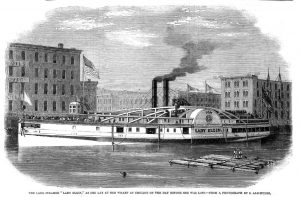 Just before midnight on September 7, 1860, a palatial sidewheel steamboat named the Lady Elgin left Chicago bound for Milwaukee. She was carrying about 400 passengers. She was returning to Milwaukee from a day-long outing to Chicago. Also on the water that night was the Augusta, a schooner filled with lumber. The captain of the Lady Elgin took notice of the Augusta around 2:30am. The night was stormy, and visibility was poor. Storm clouds raged and the waves were intense.
Just before midnight on September 7, 1860, a palatial sidewheel steamboat named the Lady Elgin left Chicago bound for Milwaukee. She was carrying about 400 passengers. She was returning to Milwaukee from a day-long outing to Chicago. Also on the water that night was the Augusta, a schooner filled with lumber. The captain of the Lady Elgin took notice of the Augusta around 2:30am. The night was stormy, and visibility was poor. Storm clouds raged and the waves were intense.
Suddenly, the lumber on the Augusta shifted, causing the two ships to collide. Instantly, the party atmosphere that had been on the Lady Elgin, turned to chaos and confusion. The Augusta received only minor damage in the collision, and kept right on sailing to Chicago. It wasn’t an unusual occurrence in those days. It’s possible that the Augusta assumed that if it wasn’t badly hurt, that larger ship probably wasn’t either. I can’t say for sure, but I know that this collision, in which the Augusta did not stop is not the first I have heard of such an incident in Maritime history. A large hole in the side of the Lady Elgin doomed the ship, which sank within thirty minutes. Only three lifeboats were able to be loaded and set into the water. The ships large upper hurricane deck fell straight into the water and served as a raft for some forty people.
The ship had crashed two to three miles off the shore of Highland Park, but the waves were so strong that survivors, bodies, and debris were all swept down to the northern shore of Winnetka. In those days, the lakeshore in this area consisted of a narrow strip of beach rising up to clay cliffs almost 50 feet high. An angry line of breakers churned up from the storm were crashing ashore. Around 6:30am the first of the three lifeboats made it to shore in the vicinity of the Jared Gage house…which still stands at 1175 Whitebridge Hill Road. A desperate call for assistance went out to the town from the Gage house. The people of Winnetka rode 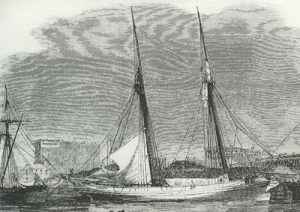 horses down to Northwestern University and the Garrett Biblical Institute to find any young men to help pull out survivors. The regional newspapers were quickly informed by telegraph. The newly completed Chicago and Milwaukee train line brought people to Winnetka to help as word of the accident spread. The effort to save the people on the Lady Elgin would have been a phenomenal feat today, but it was carried out in 1860, making it even more amazing.
horses down to Northwestern University and the Garrett Biblical Institute to find any young men to help pull out survivors. The regional newspapers were quickly informed by telegraph. The newly completed Chicago and Milwaukee train line brought people to Winnetka to help as word of the accident spread. The effort to save the people on the Lady Elgin would have been a phenomenal feat today, but it was carried out in 1860, making it even more amazing.
The crowds on the bluffs and beaches watched as pieces of wreckage washed up near the site of the present Winnetka water tower. By 10:00am, the bluffs were littered with people who had been strong enough to withstand the fierce storm of the previous night. Lastly came the hurricane deck with Captain Wilson and eight survivors whom the storm had thus far spared. Then, before their eyes, this storm-battered deck was dashed to pieces on an offshore sandbar and all on board were lost.
The storm left a tremendous undertow, creating the tragic situation…the exhausted victims had drifted close enough to the Winnetka shore to see it, only to be held back by the breakers. As the horrified onlookers watch, they died in full view of the people on shore, who could do nothing but watch. Men were lowered from the bluff with rope tied around their waists in attempts to pull people in to safety. One Evanston seminary student, Edward Spencer, is credited with saving 18 lives. Spencer is said to have repeatedly rushed into the sea, being battered by debris in order to save more people. I do not know, but I suspect that he is some relation to me on my Spencer side, and I feel honored that he was such a heroic figure. Spencer is said to have wondered many times in the aftermath, “Did I do my best?” It is the mark of a hero, never to feel like they did enough. Another man, Joseph Conrad, was said to have pulled 28 to safety. Other unknown rescuers pulled in survivors up and 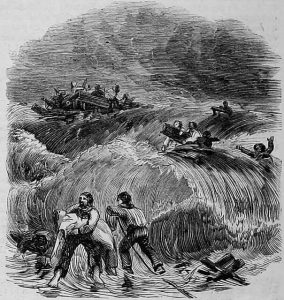 down the Winnetka and North Shore coastline.
down the Winnetka and North Shore coastline.
The Gage house, the Artemas Carter house at 515 Sheridan Road, and other Winnetka residences served as temporary hospitals. The newly-built Winnetka train depot served as a morgue. Winnetka residents brought food and clothing for the survivors. It is estimated that 302 people lost their lives that day, the exact number is unknown, as the ships manifest went down with the ship. The 1860 census shows only 130 residents in the town of Winnetka. The tragedy captured the nation’s attention, but was quickly overshadowed by the 1860 elections and the Civil War. Such is the way of things. An tragic event is only well remembered, until another comes to take its place.
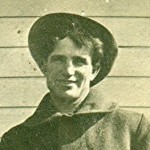
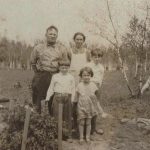 I never had the opportunity to get to know my Grandpa Allen Luther Spencer, because he passed away before my parents were married, and 4½ years before I was born. Life was not always easy for my grandfather. His first marriage ended in divorce, following the death of his daughter, Dorothy, which was quickly followed by the birth of his son, Norman. The loss of a child can be so devastating, that many people never recover, and many marriages fail. It was a dark time for him, until he met my grandmother.
I never had the opportunity to get to know my Grandpa Allen Luther Spencer, because he passed away before my parents were married, and 4½ years before I was born. Life was not always easy for my grandfather. His first marriage ended in divorce, following the death of his daughter, Dorothy, which was quickly followed by the birth of his son, Norman. The loss of a child can be so devastating, that many people never recover, and many marriages fail. It was a dark time for him, until he met my grandmother.
After their marriage and four more children, Laura in 1912, Bill in 1922, Allen (my dad) in 1924, and Ruth in 1925, it looked like his life was on the right track again. Of course, like many other people, this good period was followed by the Great Depression. Thankfully, my grandfather was a carpenter (mostly for the Great Northern Railway), and as near as I can tell, had a job throughout the Great Depression. Still, times were tough, and I’m sure the wages were not what a family of six really needed to live. Most people struggled during the Great Depression.
My grandfather was a product of his circumstances, and the times he lived in, and the two things together created a stressful life for him and his second family. Much more was expected of the two older children, and feelings were raw at times. The younger two children really never remember his being so hard on them. Grandpa had specific ideas of things the children should learn and do. All of the children learned to play the violin and some learned the guitar. My Aunt Laura never really liked learning to play the violin, but the rest of the children did…or at least they did later. Grandpa Spencer may not have been an easy teacher, or maybe it’s just hard to learn from your dad.
No matter what kind of a man my grandfather was, and whether circumstances led to his troubles, his children loved him very much. Like any family, kids and parents “lock horns” sometimes. That doesn’t mean you don’t love them. When my grandfather was dying, my dad drove from Casper, Wyoming to Superior, Wisconsin, 980 
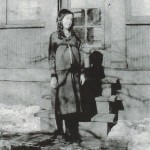 miles, in 17 hours. That might not seem like a big deal these days, but cars didn’t do what they can do now, and speeds were different then too. Needless to say, my dad made it home to see his dad before he passed away, and he was always thankful that he made the trip, and always thankful that he saw his dad one more time. I only wish I could have met him and gotten to know him too. I feel like I missed out, on my grandfather and my Grandma Spencer, who passed away when I was 2½ months old. Happy birthday in Heaven Grandpa Spencer. I look forward to meeting you someday soon.
miles, in 17 hours. That might not seem like a big deal these days, but cars didn’t do what they can do now, and speeds were different then too. Needless to say, my dad made it home to see his dad before he passed away, and he was always thankful that he made the trip, and always thankful that he saw his dad one more time. I only wish I could have met him and gotten to know him too. I feel like I missed out, on my grandfather and my Grandma Spencer, who passed away when I was 2½ months old. Happy birthday in Heaven Grandpa Spencer. I look forward to meeting you someday soon.
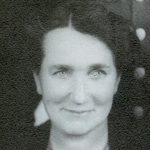
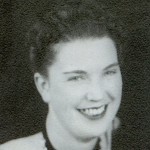 I can’t imagine having my first child on my own birthday, but it does happen, and did happen for my grandmother, Anna Schumacher Spencer and her first born, Laura Spencer Fredrick. Then, to top it off, it would be ten years before Grandma’s second child, my Uncle Bill was born. No one that I have talked to is sure why there would be ten years in between those first two children. After my Uncle Bill was born in 1922, my dad, Allen would follow in 1924 (15 months after Uncle Bill), and Aunt Ruth in 1925 (18½ months after my dad). Nevertheless, Aunt Laura was an only child for ten years, and during that time, she and her mom were very close. They did everything together. Of course in the early years, that made sense, since Aunt Laura was a little girl who didn’t go to school or anything, but even later, there were wonderful trips with family and friends into town and shopping.
I can’t imagine having my first child on my own birthday, but it does happen, and did happen for my grandmother, Anna Schumacher Spencer and her first born, Laura Spencer Fredrick. Then, to top it off, it would be ten years before Grandma’s second child, my Uncle Bill was born. No one that I have talked to is sure why there would be ten years in between those first two children. After my Uncle Bill was born in 1922, my dad, Allen would follow in 1924 (15 months after Uncle Bill), and Aunt Ruth in 1925 (18½ months after my dad). Nevertheless, Aunt Laura was an only child for ten years, and during that time, she and her mom were very close. They did everything together. Of course in the early years, that made sense, since Aunt Laura was a little girl who didn’t go to school or anything, but even later, there were wonderful trips with family and friends into town and shopping.
During those early years, Grandpa Allen Spencer, worked a number of jobs. At one time, he worked in the lumber business, taking his little family to the camp in the middle of the woods. I’m sure it was rather a lonely existence for Grandma, but she had her little daughter to keep her company, and that helped a lot. For long months they didn’t really go anywhere much, but there might have been a few other wives living in the camps. Still, mostly it was Grandma and Aunt Laura. I can imagine the games they played and the walks they took. There wouldn’t have been much else to do, so mother and daughter would have bonded over the long hours spent together. It was always so obvious to me just how proud Grandma was of her well-behaved little girl.

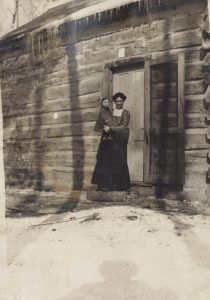 Later, there were trips taken to see family. Grandma’s little family of three was excited to be going and the other family and friends were happy to see them. Aunt Laura always seemed to stay close to Grandma, but maybe that was just for the pictures. Aunt Laura was very well behaved, a credit to her mother’s upbringing. She was really quite grown up for her age, and in fact, when Uncle Bill arrived, she was his nanny at just ten years old. Grandma was running a hotel by then, and Grandpa had to work too, so Aunt Laura needed to help, and now she had a job too. I’m sure it made her feel grown up. She was very close to her brother, just like her mother had been with her. Like mother, like daughter. Today is the shared birthday of my grandmother and Aunt Laura. Both are in Heaven now, and we love and miss them very much.
Later, there were trips taken to see family. Grandma’s little family of three was excited to be going and the other family and friends were happy to see them. Aunt Laura always seemed to stay close to Grandma, but maybe that was just for the pictures. Aunt Laura was very well behaved, a credit to her mother’s upbringing. She was really quite grown up for her age, and in fact, when Uncle Bill arrived, she was his nanny at just ten years old. Grandma was running a hotel by then, and Grandpa had to work too, so Aunt Laura needed to help, and now she had a job too. I’m sure it made her feel grown up. She was very close to her brother, just like her mother had been with her. Like mother, like daughter. Today is the shared birthday of my grandmother and Aunt Laura. Both are in Heaven now, and we love and miss them very much.
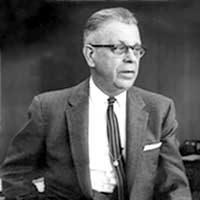 Life was not easy for Percy Lebaron Spencer, who was born to Louis and Lillian (Ottenheimer) Spencer in Howland, Maine on July 19, 1894. His father passed away when he was still a toddler and he was abandoned by his mother soon after. Spencer was brought up by his poverty-stricken uncle and aunt, who barely had enough to get by themselves. When he was seven, tragedy struck again, when his uncle died, leaving him to be the unofficial head of the household, a job he took seriously. Soon after his uncle’s passing, Spencer left school to earn a living and support himself and his aunt.
Life was not easy for Percy Lebaron Spencer, who was born to Louis and Lillian (Ottenheimer) Spencer in Howland, Maine on July 19, 1894. His father passed away when he was still a toddler and he was abandoned by his mother soon after. Spencer was brought up by his poverty-stricken uncle and aunt, who barely had enough to get by themselves. When he was seven, tragedy struck again, when his uncle died, leaving him to be the unofficial head of the household, a job he took seriously. Soon after his uncle’s passing, Spencer left school to earn a living and support himself and his aunt.
Spencer as a very curious boy, who always wanted to know how things worked, once spending days exploring a log hauler truck that broke down in front of his house, trying to figure out how it worked. That curiosity never left him, and was at the root if his inventor’s mind. Between the ages of 12 and 16 he worked at a spool mill. He left the mill upon learning about an opening at a paper factory that was going to be run on electricity. Living in a remote town, an electrically run factory was exciting and new, and something that Spencer’s mind could not resist. This was a new concept in the remote town where he lived. He didn’t know much about electricity, so he learned as much as he could about it and applied for the job of wiring the plant. He was one of three people chosen for the job. Which is amazing to me, because he was not a trained electrician, but then I guess no one else was either. Still, he had no training of any kind, and learned his job…on the job.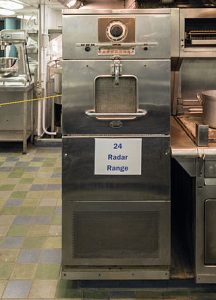
At the age of 18, Spencer’s took another turn, but this one was not a tragedy. He joined the United States Navy and it was there that he learned about wireless and radio technology. Always highly motivated, Spencer learned and gained expertise in a number of fields such as trigonometry, calculus, chemistry, physics, and metallurgy by reading extensively about them. He also became an expert in radar tube design, and worked at a company called Raytheon as the chief of the power tube division. Spencer was a great asset to Raytheon, and his expertise helped the company win a major contract from the US government to produce magnetrons for radar equipment which was became invaluable in the second world war. Under his leadership, the division expanded from a mere 15 employees to more than 5000 employees and productivity was also largely improved.
Probably the most commonly used of Spencer’s inventions in modern times, and one many people might not know was his invention, was the microwave oven. What household doesn’t have one? This invention was purely coincidental, though. One day while working at the plant, he crossed an active radar set when he noticed that the candy in his pocket had suddenly melted. His curiosity was immediately heightened, and he set about finding out how that had happened. He decided to experiment further by testing out different types of foods, such as unpopped kernels of corn. To his surprise and delight, they began to pop. Unlike others who had experienced the same, Spencer was keen to learn more about it.
Spencer began to research further, and documented his findings. Then he filed for and was granted a patent in  1945. In 1947, he produced the first commercially built microwave which was between 5 and a half to 6 feet tall and weighed around 750 pounds…not exactly the compact unit we have today. It cost between $2000 to $3000 and was initially used in restaurants, railways, and ships, as they were too bulky and expensive for home use. The early models did have some shortcomings. Meats would not cook properly in the unit. So, Spencer set about researching again, and modified his design. The first microwave for home use was developed in 1967. It cost $495 and could be fit on a kitchen counter top. So the next time you pop something into the microwave, remember that it was Percy Lebaron Spencer, who made it possible for you to do so.
1945. In 1947, he produced the first commercially built microwave which was between 5 and a half to 6 feet tall and weighed around 750 pounds…not exactly the compact unit we have today. It cost between $2000 to $3000 and was initially used in restaurants, railways, and ships, as they were too bulky and expensive for home use. The early models did have some shortcomings. Meats would not cook properly in the unit. So, Spencer set about researching again, and modified his design. The first microwave for home use was developed in 1967. It cost $495 and could be fit on a kitchen counter top. So the next time you pop something into the microwave, remember that it was Percy Lebaron Spencer, who made it possible for you to do so.
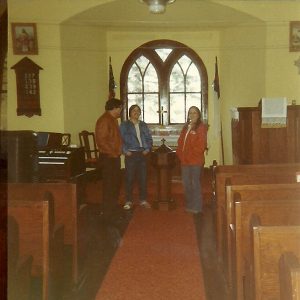
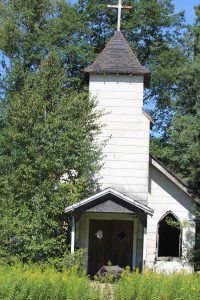 I never got the chance to see the church in the little town of Holyoke, Minnesota, where my dad, Al Spencer and his siblings spent much of their growing up years…at least not before it fell into terrible disrepair. My dad’s parents rented a farm in the area, and the little Lutheran Church in town was their church. The kids helped on the farm and went to school in the area, but the church held a special significance to the family. Of course, being a very religious family, church was the center of their lives. Everything else came after time with the Lord. For me and my sisters, that has been something that our parents, Allen and Collene Spencer carried forward into their marriage, and we will be forever grateful for that solid Christian upbringing. That in many ways got started in that little church in Holyoke, Wisconsin.
I never got the chance to see the church in the little town of Holyoke, Minnesota, where my dad, Al Spencer and his siblings spent much of their growing up years…at least not before it fell into terrible disrepair. My dad’s parents rented a farm in the area, and the little Lutheran Church in town was their church. The kids helped on the farm and went to school in the area, but the church held a special significance to the family. Of course, being a very religious family, church was the center of their lives. Everything else came after time with the Lord. For me and my sisters, that has been something that our parents, Allen and Collene Spencer carried forward into their marriage, and we will be forever grateful for that solid Christian upbringing. That in many ways got started in that little church in Holyoke, Wisconsin.
There was something else that endeared the little church to our family, and really the reason that my family visited it on a trip back to Wisconsin. My Uncle Fritz Fredrick, who was then married to my dad’s sister, Laura, was exceptional at furniture building, and he put that talent into building the baptismal font for the church. It was a really special gift to them. In fact the story of the baptismal font and its special connection to our family is the reason my dad’s brother, Bill Spencer brought the family to the little church in the first place. Of course, my dad knew about the baptismal font, but the rest of the family who were on that trip wanted to see it firsthand. I think the most amazing part of the history of it…to us anyway, was that someone in our family had a part in it.
When the little church closed…sadly, my Uncle Bill asked for the baptismal font. He wanted it to be passed to one of Fritz’s sons. In the end, Fritz’s son Dennis ended up with the baptismal font. I’m sure it was a treasure for him. While the font was a beautiful piece of church furniture, the real treasure is that it was made by his dad’s hands. Many churches have one of a mass produced baptismal font, and they are beautiful, but this one was made with love by the hands of a family member, and that makes this one so much more special. I wish I 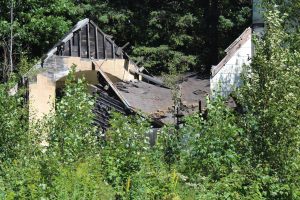
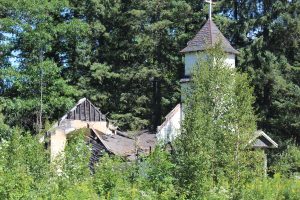 could have seen that baptismal font, in that little church in Holyoke…in the intended setting for it. It think I would have been in awe of both the baptismal font and the church. It made me very sad to see the little church in its final state…when I was finally able to get back to Holyoke. It just seems so wrong to have a church in such dilapidation…a condition that should never be the fate of a church.
could have seen that baptismal font, in that little church in Holyoke…in the intended setting for it. It think I would have been in awe of both the baptismal font and the church. It made me very sad to see the little church in its final state…when I was finally able to get back to Holyoke. It just seems so wrong to have a church in such dilapidation…a condition that should never be the fate of a church.
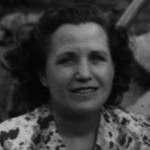 After a number of years of wondering what happened after the writing of my Aunt Bertha Schumacher Hallgren’s journals, or my reading of them…I have wondered about so many things. Bertha’s journal was so detailed and so interesting, but it left me feeling a little bit “at loose ends” about the lives of my aunt, and the Carl and Albertine Schumacher family, of which I am a part. I knew some things of course, like the fact that my Aunt Bertha had breast cancer, and that Aunt Mina had rheumatoid arthritis, as did her mom, my great grandma, Albertine Schumacher, and her siblings, my grandma, Anna Spencer and my Uncle Fred Schumacher. It left me wondering why it is that so often our lives come down to what illness we might have had? And then Aunt Bertha answers the question I had, when she said, “Only deep impressions are held in the conscious mind…ever present, while the sub-conscious may retain all experiences.” I suppose that our lives are marked by events, but surely there must be things that are more important that what disease a person had. Nevertheless, Aunt Bertha was “in my opinion” and that of my family, an excellent writer. She told the human side of history, and not just the historical events. Without the human side, history can be very boring, but you put in the hopes,
After a number of years of wondering what happened after the writing of my Aunt Bertha Schumacher Hallgren’s journals, or my reading of them…I have wondered about so many things. Bertha’s journal was so detailed and so interesting, but it left me feeling a little bit “at loose ends” about the lives of my aunt, and the Carl and Albertine Schumacher family, of which I am a part. I knew some things of course, like the fact that my Aunt Bertha had breast cancer, and that Aunt Mina had rheumatoid arthritis, as did her mom, my great grandma, Albertine Schumacher, and her siblings, my grandma, Anna Spencer and my Uncle Fred Schumacher. It left me wondering why it is that so often our lives come down to what illness we might have had? And then Aunt Bertha answers the question I had, when she said, “Only deep impressions are held in the conscious mind…ever present, while the sub-conscious may retain all experiences.” I suppose that our lives are marked by events, but surely there must be things that are more important that what disease a person had. Nevertheless, Aunt Bertha was “in my opinion” and that of my family, an excellent writer. She told the human side of history, and not just the historical events. Without the human side, history can be very boring, but you put in the hopes, 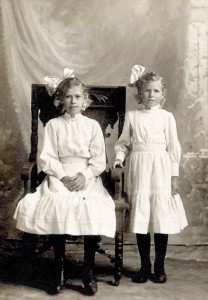 dreams, feelings, illnesses, and everyday lives of the people involved in the history being discussed. That is when history comes to life.
dreams, feelings, illnesses, and everyday lives of the people involved in the history being discussed. That is when history comes to life.
My Aunt Bertha and her sister, my Aunt Elsa took care of their parents who were ill, and in doing so, they gave up the chance to have a family of their own. They “adopted” their sister, Mina’s children as a replacement for children of their own. They both assumed that marriage was also one of those things they would have to give up, but in their latter years, both were given back that part of their lives, when they met and married their husbands, Arthur (Bertha) Hallgren and Frank (Elsa) Lawrence. Unfortunately, neither marriage lasted long, with Elsa’s ending in Frank’s death after 6 years, and Bertha’s ending in Arthur’s death after 2½ years.
Aunt Bertha fretted some when Elsa got married, not because Elsa was getting married. Bertha was happy for her, but she and Elsa had lived together all their lives to that point…42 years in all. Bertha said that it felt like a divorce…dividing up the household, “you take this and I’ll take that.” Bertha had never lived alone before. I’m sure she felt lonely…even before Elsa left. Then, after Elsa returned home when her husband passed away, when Bertha was ill, she worried about how Elsa would do when she was gone. Bertha was really very protective of her little sister, who had never lived alone. In the end, Elsa would live 17 years beyond Bertha’s life. She was ok, but I know she  missed Bertha terribly.
missed Bertha terribly.
I knew that my great grandparents were Christians, and had raised their children as Christians, and that teaching came down through the generations. Nevertheless, I was very moved by the way my aunt expressed her faith and trust in God. She knew that her life would not have been nearly as blessed as it was, if it had been lived without God in her life. I don’t know why it seems new to me, but I guess it’s because people don’t often talk about their faith, here she was, telling about the deep relationship with God. It was very moving, and sweet. Bertha was a woman who had been single for all but 2½ years of her life. She learned to depend on God…to trust Him. She loved her Lord, and I love that.

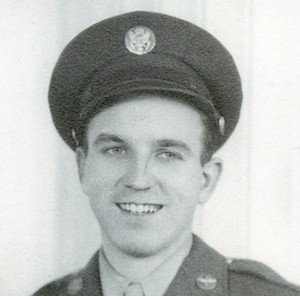 While listening to an audible book about World War II, called “Flak,” I heard one of the men being interviewed by the author for the book say, “History is told by the survivors.” It occurred to me that in most cases, at least in eras gone by, that was the truth. In order to know what really happened, there had to be a survivor. Even today, in an era of DNA, forensic science, black boxes, and phone video, there are events that cannot be definitively explained, and causes that remain a mystery.
While listening to an audible book about World War II, called “Flak,” I heard one of the men being interviewed by the author for the book say, “History is told by the survivors.” It occurred to me that in most cases, at least in eras gone by, that was the truth. In order to know what really happened, there had to be a survivor. Even today, in an era of DNA, forensic science, black boxes, and phone video, there are events that cannot be definitively explained, and causes that remain a mystery.
In World War II, survival was one of the main necessities to properly make an account of events. One might be able to look at pictures an know that the attack was bad, but in order to understand what it meant to fly through flak, someone had to really explain what the flak looked like up close, and tell us how hot it was when it got close enough to put a hole in the fuselage of the plane. We can imagine the fear the soldiers of World War II felt, but only because someone has “painted” a picture of just how bad it was to be pinned down in a foxhole with bombs raining down all around you, and bullets flying past if you tried to get out and run. No amount of 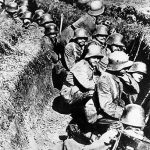 modern technology can explain how a soldier might have felt upon looking at his helmet to find a hole in it where shrapnel pierced it, and the soldier received only a small scratch. All of the “facts” that can be gleaned from the modern technology we have simply can’t tell us about how people felt.
modern technology can explain how a soldier might have felt upon looking at his helmet to find a hole in it where shrapnel pierced it, and the soldier received only a small scratch. All of the “facts” that can be gleaned from the modern technology we have simply can’t tell us about how people felt.
My dad, Allen Spencer was a top turret gunner in a B-17G bomber stationed in Great Ashfield. He told once about the ball turret gunner being shot up, and the desperate and futile effort to save his life. It was something Dad would never forget. The bombers that crashed taking all hands down with them, left no witnesses to tell if it was shot down or had engine trouble. If the plane could be found today, they might be able to guess at the cause of the crash, but it still might not be definitive. As to the soldiers who went missing in action, it was not uncommon for their body never to be found, and so no one could document their death, unless a buddy survived. All of the war stories we have today from World War II were told by the men, and women too, who survived. We know from the ones who witnessed the planes being shot down, blown up, or crashing with engine trouble. On the battlefield, the only witnesses were the other 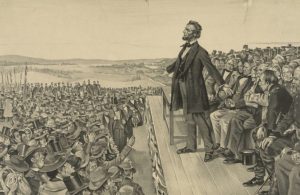 soldiers in the area, because the civilians had run far from the area.
soldiers in the area, because the civilians had run far from the area.
Even the non-war events of history had to have a “survivor” to tell about the event. It may not have been a violent event, but the Gettysburg Address would never have been known to anyone, if it had been spoken aloud in President Lincoln’s study with no one present. The speech might have been found later, but the depth of it’s meaning might have been completely lost had one witness not been so deeply moved by the speech. I wonder how much history was lost because no one was there to see and then survive to tell about it. It’s something to think about.
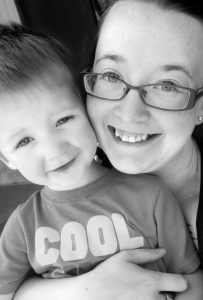
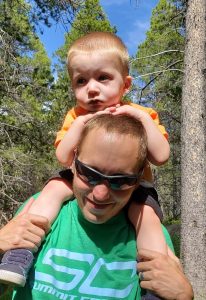 My great grand nephew, Jaxx Harman is the youngest on my grand nephew Jake Harman and his wife Melanie’s three children. Jaxx is their only son, and having two older sisters can be awesome, or it can be a fight. Thankfully for Jaxx, he has great sisters. While there are those minor disagreements that all siblings have, they are pretty great to have around. For most of his life, his older sisters have been showing him the ropes of life, but Jaxx is getting to be a big boy now, and his own attitude is starting to present itself into the family picture. A boy with two older sisters has to get a handle on things before he gets too old, or they girls will push him around.
My great grand nephew, Jaxx Harman is the youngest on my grand nephew Jake Harman and his wife Melanie’s three children. Jaxx is their only son, and having two older sisters can be awesome, or it can be a fight. Thankfully for Jaxx, he has great sisters. While there are those minor disagreements that all siblings have, they are pretty great to have around. For most of his life, his older sisters have been showing him the ropes of life, but Jaxx is getting to be a big boy now, and his own attitude is starting to present itself into the family picture. A boy with two older sisters has to get a handle on things before he gets too old, or they girls will push him around.

Jaxx can’t have that. At the grown up age of three, he has to start asserting himself…or at least that’s what he has decided. Jaxx is all boy, and like many boys, he loves to wrestle, fight, and in general, be ornery. According to his mom is a little monkey. I can totally picture that too. From jumping on the bed…when Mommy isn’t looking, to climbing on every thing he can think of. It’s every “boy-mom’s” stressor. Still, when Jaxx looks at his mommy, her heart just melts too, because he is, after all, her boy and she loves him!! While Jaxx is ornery, he still is just so sweet too. It’s all part of his charm.
Jaxx loves his sisters, but he is the brother, and brothers must tease sisters. I think that is an unspoken rule!! His favorite argument with his sisters is, “Who is Daddy’s Favorite!!” Of course, his daddy loves each of his children equally, but it’s a fun argument to have, and Jaxx is just figuring that out. Jaxx may be the youngest child, but he can still give his sisters a “run for their money” when it comes to a fight. His sister Izabella fights and wrestles back, but his oldest sister, Alice takes it pretty easy 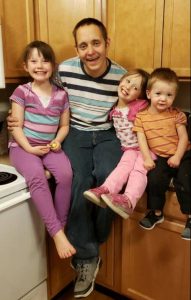
 on him. I’m sure she worries about hurting him. That could change as he gets older, and bigger.
on him. I’m sure she worries about hurting him. That could change as he gets older, and bigger.
Jaxx is learning about manners and etiquette. He is very careful to follow some basic rules. If someone sneezes, Jaxx is quick to say, “Bless you.” He is learning things like please, thank you, and excuse me too. One of the very sweetest aspects of his personality, is that Jaxx loves to pray at bedtime and before eating. His little spirit loves God so much, and he wants to know more about Him. His parents are active in their church, and Jaxx wants to be just like them. He has good role models to follow after all. Today is Jaxx’s 3rd birthday. Happy birthday Jaxx!! Have a great day!! We love you!!
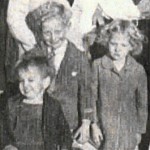
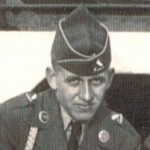 My Uncle Larry was born during the years of the Great Depression, in an era of big families. He was the 4th child and first son of my grandparents, George and Hattie Byer. While times were tough, the one thing that George and Hattie had plenty of was love. The family was rich in that. My mother, Collene Spencer, followed Uncle Larry in quick succession, arriving when he was just 20 months old. Following Mom, Uncle Wayne arrived two years later. Their childhood would be spent as close friends and allies, along with the associated sibling arguments too, I’m sure. While I’m not sure how the boys felt about Mom tagging along in things, they didn’t really complain too much, and defended their sister when needed. For her part, Mom considered these brothers, the only ones she had, to be…maybe her charges too somehow. She might very well be prone to protecting them, whether they needed it or not, even against their mother…to her detriment sometimes, because it earned her the same punishment that Grandma Byer was dishing out to her sons. Still, my mom looked up to and loved her brothers. I suppose that to a degree, being the girl between the brothers made her a bit of a tomboy, but it also shaped her into the wonderful woman who became my mom.
My Uncle Larry was born during the years of the Great Depression, in an era of big families. He was the 4th child and first son of my grandparents, George and Hattie Byer. While times were tough, the one thing that George and Hattie had plenty of was love. The family was rich in that. My mother, Collene Spencer, followed Uncle Larry in quick succession, arriving when he was just 20 months old. Following Mom, Uncle Wayne arrived two years later. Their childhood would be spent as close friends and allies, along with the associated sibling arguments too, I’m sure. While I’m not sure how the boys felt about Mom tagging along in things, they didn’t really complain too much, and defended their sister when needed. For her part, Mom considered these brothers, the only ones she had, to be…maybe her charges too somehow. She might very well be prone to protecting them, whether they needed it or not, even against their mother…to her detriment sometimes, because it earned her the same punishment that Grandma Byer was dishing out to her sons. Still, my mom looked up to and loved her brothers. I suppose that to a degree, being the girl between the brothers made her a bit of a tomboy, but it also shaped her into the wonderful woman who became my mom.
Uncle Larry was a determined man, who wanted something better for his family. I believe that land ownership was a part of that desire. I remember wondering as a kid, why he and my Aunt Jeanette chose to live in the country. The rest of the family at that time, were city dwellers (though Casper wasn’t a large city) and it always seemed strange to me that they lived in the country. Lots of land, however, gave them the ability to have a big place to entertain, and outbuildings to pursue any other activities they might be interested in, such as ceramics. They proudly hosted ceramics sessions with any of the family who wanted to join in. Grandma and Grandpa Byer were some of those who loved going out to get their “Crafty Side” on.
All of my grandparents kids lived most of their lives in Wyoming, most of them in Casper, so when Uncle Larry took a transfer to Louisiana with Texaco, I remember being quite shocked. I’m not sure why I should have been, because my own mother had lived for 5 years in Superior, Wisconsin, where my older sister, Cheryl and I were both born. Still, at the time, I felt kind of shocked. The refinery where Uncle Larry worked, here in Casper, closed, and he wasn’t old enough to retire, so he could take the transfer or take a layoff. The choice was simple really. They mover to Louisiana and lived their until his retirement before returning to live the rest of his life in 
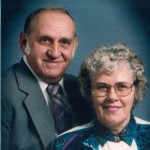 Casper, where both of their children, Larry and Tina both live too. I remember being quite happy when they moved back here. I felt like having the family back together again. My husband, Bob and I loved running into them on occasion, often at a home improvement store, where we were both looking for some new item we needed for our houses. When he passed away, I felt very sad that those impromptu meeting would now be over. Uncle Larry passed away on December 22, 2011, and I still miss him very much. Today would nave been Uncle Larry’s 86th birthday. Happy birthday in Heaven, Uncle Larry. We love and miss you very much.
Casper, where both of their children, Larry and Tina both live too. I remember being quite happy when they moved back here. I felt like having the family back together again. My husband, Bob and I loved running into them on occasion, often at a home improvement store, where we were both looking for some new item we needed for our houses. When he passed away, I felt very sad that those impromptu meeting would now be over. Uncle Larry passed away on December 22, 2011, and I still miss him very much. Today would nave been Uncle Larry’s 86th birthday. Happy birthday in Heaven, Uncle Larry. We love and miss you very much.
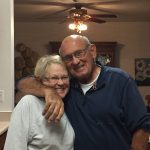 I first met my husband’s Aunt Charlys Schulenberg, years ago at a family reunion. There were so many people there that I barely got to know anyone very well. I remember most of the people but I can’t say that I had a chance to get to know any of them well. More recently, Bob and I had a chance to visit Uncle Butch and Aunt Charlys again, after many years in between those visits. I knew I liked them just from the times we had connected following my father-in-law, Walt Schulenberg’s passing. Uncle Butch and my father-in-law are half brothers. I felt a close connection to Uncle Butch, but still didn’t know Aunt Charlys well.
I first met my husband’s Aunt Charlys Schulenberg, years ago at a family reunion. There were so many people there that I barely got to know anyone very well. I remember most of the people but I can’t say that I had a chance to get to know any of them well. More recently, Bob and I had a chance to visit Uncle Butch and Aunt Charlys again, after many years in between those visits. I knew I liked them just from the times we had connected following my father-in-law, Walt Schulenberg’s passing. Uncle Butch and my father-in-law are half brothers. I felt a close connection to Uncle Butch, but still didn’t know Aunt Charlys well.
Then we went for a visit, and then for another, and I really got to know Aunt Charlys. She is a sweet, beautiful person, inside and out. She is friendly and loving. She is a great cook and tends to spoil those she loves…not a bad thing for those she loves either. When Bob and I went to visit the second time, we stayed with Aunt Charlys and Uncle Butch, and it was a wonderful visit. We had such a great time getting to know them better. They live in Forsyth, Montana on the edge of town, overlooking the Yellowstone River. It is a beautiful place, and very peaceful. We loved it, and wished the visit didn’t have to end so soon. We looked at old pictures, and they told us great stories from the past. We laughed and maybe 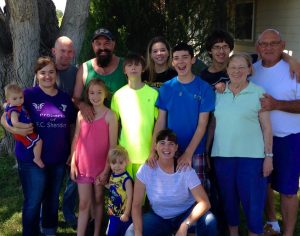 shed a few tears over people who had gone to Heaven now. Nevertheless, even through the tears, we felt blessed to know the old stories about family members now gone home. We learned a lot about the family in those visits.
shed a few tears over people who had gone to Heaven now. Nevertheless, even through the tears, we felt blessed to know the old stories about family members now gone home. We learned a lot about the family in those visits.
In those visits, I found kindred spirits in both of them. I know that in the future years, we will have more great visits, and I look forward to them very much. I wish that there had not been so many years in between the first time I met them and now, because I am not a fan of “lost time” in any way. Nevertheless, I will work toward making up for the time we have lost, because I love these very special people. Today is Charlys’ birthday. Happy birthday Aunt Charlys!! Have a great day!! We love you!!

